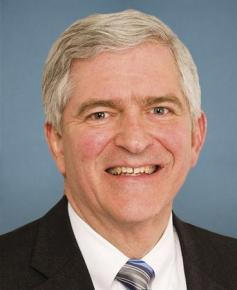|
 House
conservative group backs Webster, complicates Speaker race House
conservative group backs Webster, complicates Speaker race
 Send a link to a friend
Send a link to a friend
[October 08, 2015]
By Susan Cornwell and David Lawder
WASHINGTON (Reuters) - A small but
influential bloc of conservative Republicans in the U.S. House of
Representatives threw its support behind a longshot candidate for House
Speaker on Wednesday, complicating the party's efforts to elect John
Boehner's successor.
|
|
 The approximately 40-member House Freedom Caucus agreed to vote
for Representative Daniel Webster in a secret nominating ballot on
Thursday, showcasing its clout as it tries to push the chamber's
Republican leadership to the right to battle President Barack Obama
through 2016. The approximately 40-member House Freedom Caucus agreed to vote
for Representative Daniel Webster in a secret nominating ballot on
Thursday, showcasing its clout as it tries to push the chamber's
Republican leadership to the right to battle President Barack Obama
through 2016.
House Majority Leader Kevin McCarthy is considered the front-runner
in Thursday's intra-party vote.
If McCarthy prevails with his fellow Republicans on Thursday but
this band of conservatives continues withholding support for him, it
could deny the Californian the 218 votes needed to win the
speakership in a public vote scheduled for Oct. 29.
Democratic aides say their party's 188 members will not help
McCarthy become speaker.
 The Freedom Caucus members said the decision to support Webster on
Thursday does not bind them to vote as a bloc for the Florida
conservative in the full-House vote. They will reserve judgment
until they hear from the winner of Thursday's ballot.
"Our intention is to go all the way to the floor (with Webster)
unless real changes are made in how the House is run,"
Representative Raul Labrador told reporters after the group met on
Wednesday.
Labrador said more than 30 of the group's members voted for Webster,
meeting its 80 percent threshold for policy decisions.
Webster, 66, was first elected to Congress in the Tea Party wave of
2010 and was speaker of the Florida House of Representatives in the
1990s. Freedom Caucus members said he was best positioned to make
the changes they want, with committees given more power over
legislation and fewer backroom deals pushed onto the floor by their
leaders. The Freedom Caucus, formed this year by members
sympathetic to the small government Tea Party movement, was
instrumental in pressuring Boehner to resign after they fought a
series of internal party battles with him, most recently demanding
that a government funding bill deny money to women's health care
group Planned Parenthood.
[to top of second column] |

McCarthy for the past year has been seen as heir apparent to
Boehner, who is stepping down at the end of October. In recent days
McCarthy has sought to differentiate himself from his former mentor.
But if he cannot persuade enough conservatives to back him, the
transition could prove messy, requiring additional ballots and a
potentially damaging fight among Republicans as the presidential
election campaign ramps up. McCarthy also faces another challenger,
House Oversight Committee Chairman Jason Chaffetz.
Another House conservative, Representative Walter Jones, injected a
new wrinkle into the leadership race, requesting that all candidates
confess any personal "misdeeds" that could embarrass the party. He
did not name any specific concerns, and a spokeswoman was not
immediately available to elaborate.
In a letter to party leaders, Jones recalled past personal
controversies, such as the resignation of Speaker-elect Bob
Livingston in 1998 after an extramarital affair became public.
(Reporting by Susan Cornwell; Writing by David Lawder; Editing by
Richard Cowan and Richard Chang)
[© 2015 Thomson Reuters. All rights
reserved.]
Copyright 2015 Reuters. All rights reserved. This material may not be published,
broadcast, rewritten or redistributed.
 |